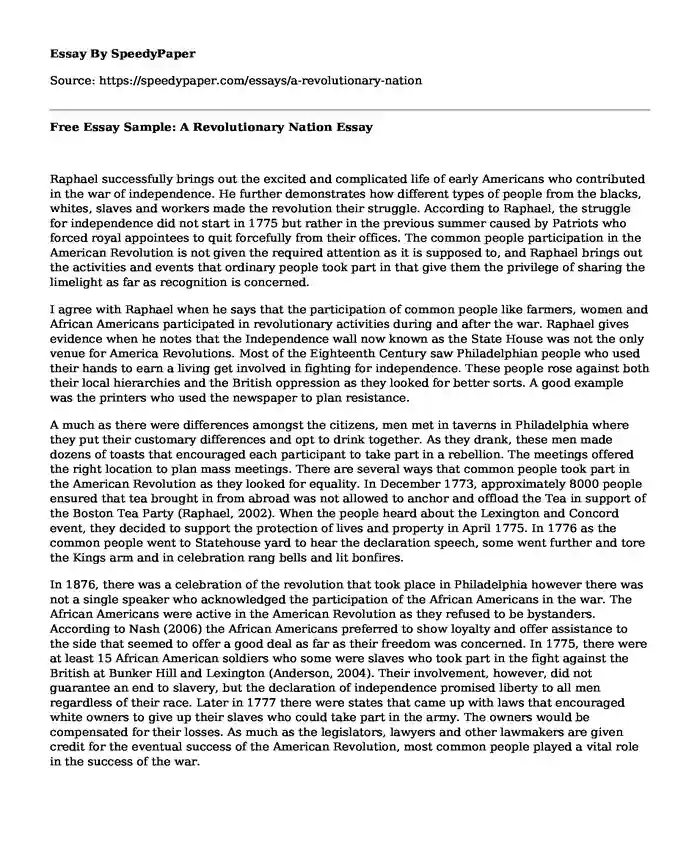
| Type of paper: | Essay |
| Categories: | History American revolution |
| Pages: | 3 |
| Wordcount: | 624 words |
Raphael successfully brings out the excited and complicated life of early Americans who contributed in the war of independence. He further demonstrates how different types of people from the blacks, whites, slaves and workers made the revolution their struggle. According to Raphael, the struggle for independence did not start in 1775 but rather in the previous summer caused by Patriots who forced royal appointees to quit forcefully from their offices. The common people participation in the American Revolution is not given the required attention as it is supposed to, and Raphael brings out the activities and events that ordinary people took part in that give them the privilege of sharing the limelight as far as recognition is concerned.
I agree with Raphael when he says that the participation of common people like farmers, women and African Americans participated in revolutionary activities during and after the war. Raphael gives evidence when he notes that the Independence wall now known as the State House was not the only venue for America Revolutions. Most of the Eighteenth Century saw Philadelphian people who used their hands to earn a living get involved in fighting for independence. These people rose against both their local hierarchies and the British oppression as they looked for better sorts. A good example was the printers who used the newspaper to plan resistance.
A much as there were differences amongst the citizens, men met in taverns in Philadelphia where they put their customary differences and opt to drink together. As they drank, these men made dozens of toasts that encouraged each participant to take part in a rebellion. The meetings offered the right location to plan mass meetings. There are several ways that common people took part in the American Revolution as they looked for equality. In December 1773, approximately 8000 people ensured that tea brought in from abroad was not allowed to anchor and offload the Tea in support of the Boston Tea Party (Raphael, 2002). When the people heard about the Lexington and Concord event, they decided to support the protection of lives and property in April 1775. In 1776 as the common people went to Statehouse yard to hear the declaration speech, some went further and tore the Kings arm and in celebration rang bells and lit bonfires.
In 1876, there was a celebration of the revolution that took place in Philadelphia however there was not a single speaker who acknowledged the participation of the African Americans in the war. The African Americans were active in the American Revolution as they refused to be bystanders. According to Nash (2006) the African Americans preferred to show loyalty and offer assistance to the side that seemed to offer a good deal as far as their freedom was concerned. In 1775, there were at least 15 African American soldiers who some were slaves who took part in the fight against the British at Bunker Hill and Lexington (Anderson, 2004). Their involvement, however, did not guarantee an end to slavery, but the declaration of independence promised liberty to all men regardless of their race. Later in 1777 there were states that came up with laws that encouraged white owners to give up their slaves who could take part in the army. The owners would be compensated for their losses. As much as the legislators, lawyers and other lawmakers are given credit for the eventual success of the American Revolution, most common people played a vital role in the success of the war.
References
Anderson, D. (2004). Lexington and Concord, April 19, 1775. New York: Enchanted Lion Books.
Raphael, R. (2002). The first American revolution: Before Lexington and Concord. New York: New Press.
Davenport, J. (2007). The American Revolution. Detroit: Lucent Books.
Nash, G. B. (2006). The forgotten fifth: African Americans in the age of revolution. Cambridge, MA: Harvard University Press.
Cite this page
Free Essay Sample: A Revolutionary Nation. (2019, May 29). Retrieved from https://speedypaper.net/essays/a-revolutionary-nation
Request Removal
If you are the original author of this essay and no longer wish to have it published on the SpeedyPaper website, please click below to request its removal:
- Essay Example on Genetic Diseases
- MBTI and DISC Comparison And Contrast
- Which term best describes your industry?
- Essay Example: Review of the Article Songbird or Subversive
- Free Essay on Mental Health of Veterans
- Essay Sample on Workplace Ergonomics and Hazard Assessment
- Compare and Contrast Essay Sample of Herland and The Yellow Wallpaper and Women and Economic
Popular categories




